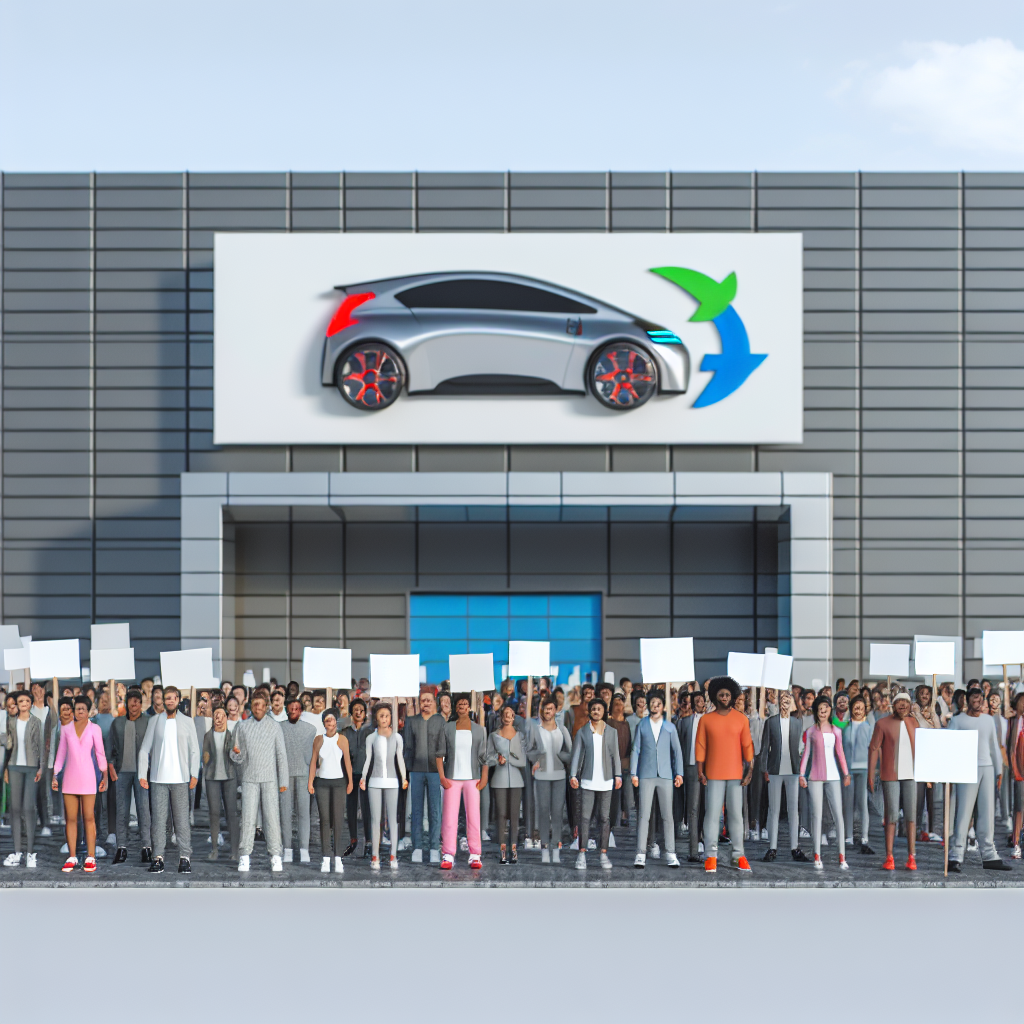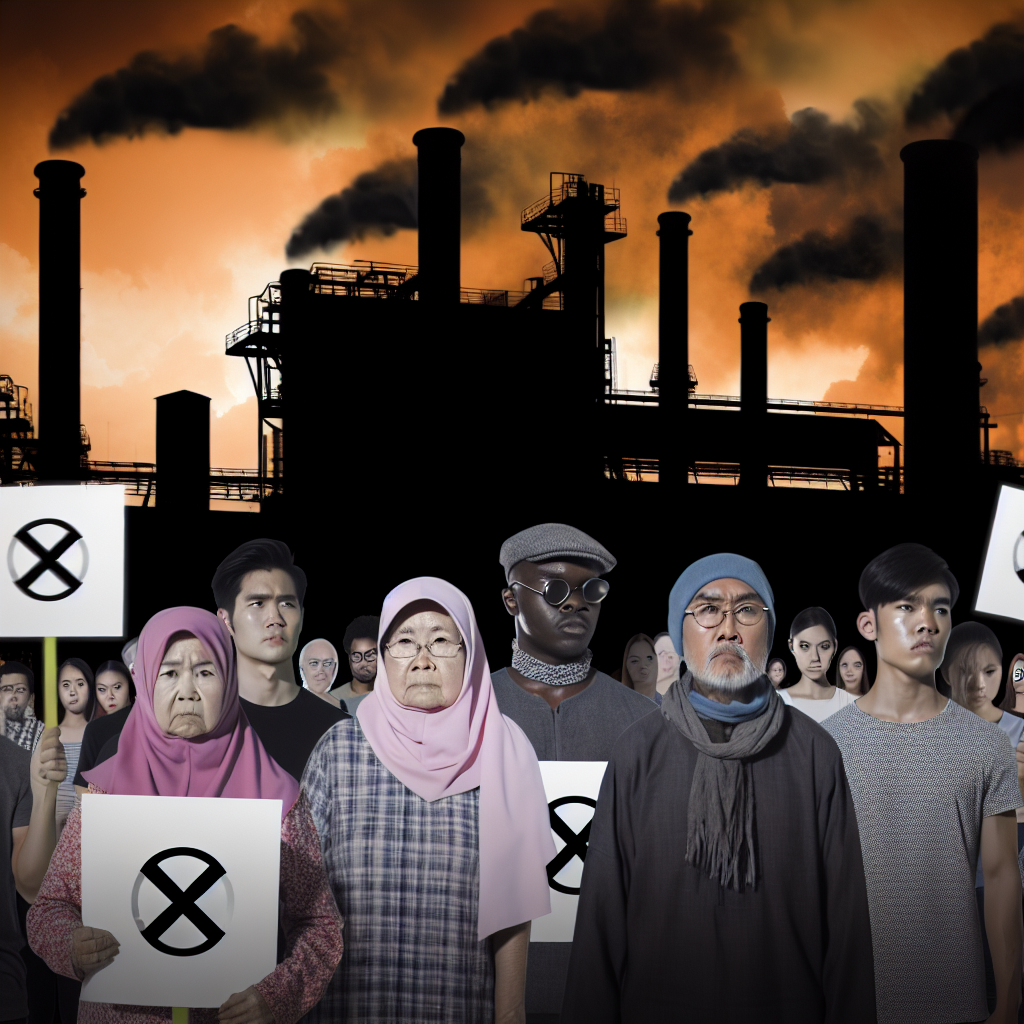The Impact of Climate Protests on Tesla’s Operations
Inside the Climate Protests Hell-Bent on Stopping Tesla
Climate change has become one of the most pressing issues of our time, and as a result, environmental activists have taken to the streets to demand action. One of the companies that has found itself in the crosshairs of these protests is Tesla, the electric vehicle and clean energy giant. These climate protests have had a significant impact on Tesla’s operations, forcing the company to navigate a complex landscape of public opinion, legal challenges, and logistical hurdles.
One of the main concerns raised by climate activists is the environmental impact of Tesla’s operations. While the company’s electric vehicles are seen as a step in the right direction, some argue that the production process and supply chain still contribute to greenhouse gas emissions. Protesters have called on Tesla to further reduce its carbon footprint and adopt more sustainable practices throughout its operations.
In response to these concerns, Tesla has made efforts to address its environmental impact. The company has invested in renewable energy projects, such as solar and wind farms, to power its operations. Additionally, Tesla has implemented measures to reduce waste and increase recycling in its manufacturing processes. These steps have been seen as positive by some activists, but others argue that they are not enough and that Tesla needs to do more to truly be a leader in the fight against climate change.
Another issue that has sparked protests against Tesla is the company’s use of lithium-ion batteries. While these batteries are crucial for electric vehicles, they require the extraction of lithium, a resource that is often obtained through environmentally damaging practices. Activists have called on Tesla to find alternative battery technologies that are more sustainable and do not contribute to the destruction of ecosystems.
Tesla has acknowledged these concerns and has committed to finding ways to improve the sustainability of its battery supply chain. The company has explored partnerships with mining companies that prioritize responsible sourcing and has invested in research and development to find alternative battery technologies. However, these efforts take time, and activists argue that Tesla needs to expedite its transition away from lithium-ion batteries to truly address the environmental impact of its products.
In addition to these environmental concerns, climate protests have also targeted Tesla’s business practices. Some activists argue that the company’s aggressive expansion and production goals are contributing to overconsumption and resource depletion. They argue that Tesla’s focus on selling more cars and expanding its market share is at odds with the need to reduce overall energy consumption and promote sustainable transportation options.
Tesla has defended its growth strategy, arguing that the widespread adoption of electric vehicles is essential to combat climate change. The company believes that by increasing its production and making electric vehicles more accessible, it can accelerate the transition to a sustainable transportation system. However, activists continue to push for a more holistic approach that considers the broader implications of Tesla’s business model.
In conclusion, climate protests have had a significant impact on Tesla’s operations. The company has faced scrutiny over its environmental impact, particularly regarding its production processes and battery supply chain. While Tesla has taken steps to address these concerns, activists argue that more needs to be done. Additionally, protests have also targeted Tesla’s business practices, questioning the company’s growth strategy and its contribution to overconsumption. As the fight against climate change intensifies, it remains to be seen how Tesla will navigate these challenges and continue to be a leader in the clean energy revolution.
Understanding the Motivations Behind Climate Protests Targeting Tesla

Inside the Climate Protests Hell-Bent on Stopping Tesla
Climate protests have become a common sight in recent years, with activists taking to the streets to demand action on climate change. While many of these protests target governments and corporations, there is a growing movement that has set its sights on a surprising target: Tesla, the electric vehicle manufacturer. Understanding the motivations behind these climate protests targeting Tesla requires a closer look at the company’s environmental impact and the activists’ concerns.
One of the main reasons why climate activists are targeting Tesla is the company’s reliance on lithium-ion batteries. While these batteries are essential for powering electric vehicles, their production comes with a significant environmental cost. The extraction of lithium, a key component of these batteries, often involves destructive mining practices that can harm local ecosystems and communities. Activists argue that by supporting Tesla, consumers are indirectly contributing to these harmful practices.
Another concern raised by climate activists is the carbon footprint associated with the production and disposal of electric vehicles. While electric vehicles produce zero emissions during operation, the manufacturing process still generates a significant amount of greenhouse gases. This includes the extraction and processing of raw materials, as well as the energy-intensive manufacturing processes. Additionally, the disposal of electric vehicle batteries poses a challenge, as they contain toxic materials that can harm the environment if not properly managed.
Furthermore, some activists argue that Tesla’s focus on luxury electric vehicles perpetuates a culture of consumerism and inequality. They argue that the high price tag of Tesla’s vehicles makes them inaccessible to the majority of people, reinforcing the idea that sustainability is a privilege reserved for the wealthy. By protesting against Tesla, activists hope to draw attention to the need for more affordable and accessible electric vehicles that can truly make a difference in reducing carbon emissions.
However, it is important to note that not all climate activists are against Tesla. Many recognize the company’s role in advancing electric vehicle technology and promoting renewable energy. They believe that Tesla’s innovations have the potential to revolutionize the transportation sector and accelerate the transition to a low-carbon future. These activists see their protests as a way to push Tesla to do even better, to address the environmental concerns associated with their products and operations.
In response to the protests, Tesla has taken steps to address some of the activists’ concerns. The company has committed to sourcing lithium from environmentally responsible suppliers and has invested in research and development to improve battery recycling and disposal methods. Tesla has also expanded its product lineup to include more affordable models, making electric vehicles more accessible to a wider range of consumers.
In conclusion, the climate protests targeting Tesla are driven by a range of concerns, including the environmental impact of lithium-ion batteries, the carbon footprint of electric vehicle production, and the perceived inequality associated with luxury electric vehicles. While some activists see Tesla as a symbol of progress and innovation, others view it as a symbol of consumerism and inequality. Ultimately, these protests serve as a reminder that even companies at the forefront of sustainability efforts can still face scrutiny and pressure to do better.
Examining the Role of Activism in Shaping Tesla’s Future
Inside the Climate Protests Hell-Bent on Stopping Tesla
Examining the Role of Activism in Shaping Tesla’s Future
In recent years, Tesla has emerged as a leading force in the automotive industry, revolutionizing the way we think about electric vehicles. With their sleek designs, cutting-edge technology, and commitment to sustainability, Tesla has captured the imagination of consumers and investors alike. However, not everyone is on board with the company’s vision for the future. A growing number of climate activists have taken to the streets, protesting against Tesla and its impact on the environment.
At first glance, it may seem counterintuitive for climate activists to target a company like Tesla, which is widely regarded as a champion of clean energy. After all, Tesla’s electric vehicles produce zero emissions, and the company has made significant strides in developing renewable energy solutions. However, these activists argue that Tesla’s environmental impact extends beyond its products.
One of the main concerns raised by climate activists is the carbon footprint associated with the production of Tesla’s vehicles. While it is true that electric vehicles produce fewer emissions during operation, the manufacturing process still requires significant amounts of energy and resources. Activists argue that Tesla’s rapid expansion and the resulting increase in production have led to a surge in carbon emissions, undermining the company’s claims of sustainability.
Another issue that activists have raised is the environmental impact of Tesla’s battery technology. Tesla’s vehicles rely on lithium-ion batteries, which require the extraction of lithium, a resource that is often obtained through environmentally destructive mining practices. Activists argue that the demand for lithium has led to the destruction of fragile ecosystems and the displacement of local communities.
Furthermore, activists have criticized Tesla’s approach to labor rights. Despite its progressive image, Tesla has faced allegations of mistreatment and unsafe working conditions at its factories. Activists argue that the company’s commitment to sustainability should extend to its treatment of workers, and that Tesla should be held accountable for any violations of labor rights.
While some may dismiss these protests as misguided or misinformed, it is important to recognize the role that activism plays in shaping the future of companies like Tesla. Activism has a long history of driving social change and holding corporations accountable for their actions. By raising awareness about the environmental and social impacts of Tesla’s operations, activists are pushing the company to reevaluate its practices and strive for greater sustainability.
In response to these protests, Tesla has taken steps to address some of the concerns raised by activists. The company has made efforts to reduce its carbon footprint by investing in renewable energy sources and improving the efficiency of its manufacturing processes. Tesla has also pledged to improve working conditions and ensure that its suppliers adhere to ethical labor standards.
However, the protests have also had an impact on Tesla’s reputation and public perception. The company’s image as a leader in sustainability has been called into question, and some consumers have expressed doubts about the company’s commitment to its environmental and social goals. This highlights the power of activism to shape public opinion and influence consumer behavior.
In conclusion, the climate protests targeting Tesla are a reflection of the growing demand for greater sustainability and accountability in the business world. While Tesla has made significant contributions to the development of electric vehicles and renewable energy solutions, activists argue that the company must do more to address its environmental impact and ensure the well-being of its workers. By raising awareness and holding Tesla accountable, these protests are playing a crucial role in shaping the future of the company and the automotive industry as a whole.


